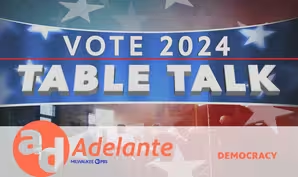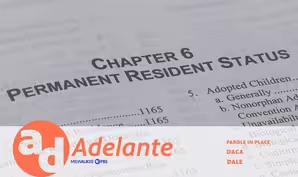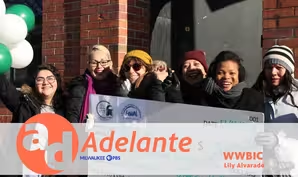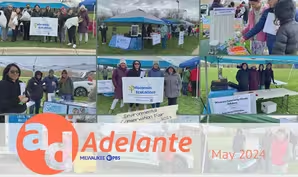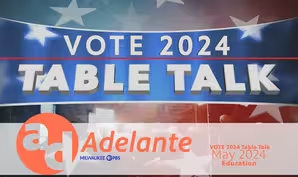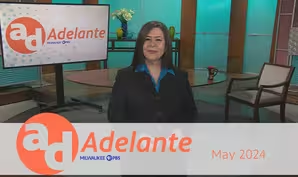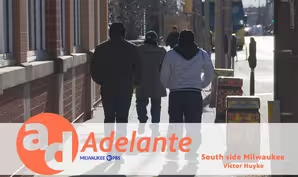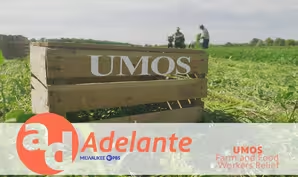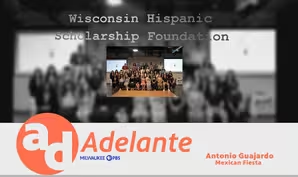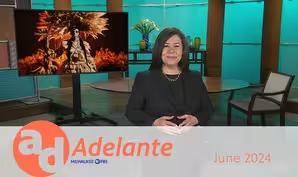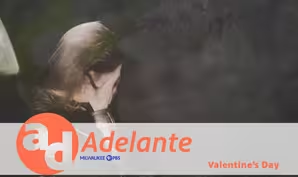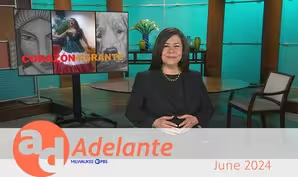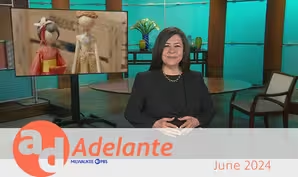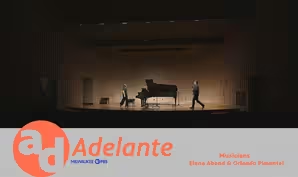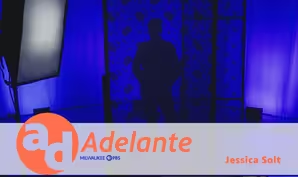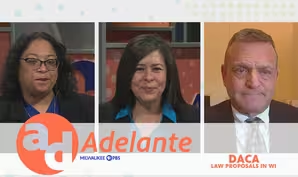Adelante
VOTE 2024 - Democracy
Clip: Season 25 | 5m 18sVideo has Closed Captions
Vote 2024 Table Talk - Democracy
In the third installment of the Vote 2024 Table Talk series, a collaboration between Marquette University, Milwaukee PBS, and ADELANTE, we’ll delve into the state of democracy in light of the upcoming presidential elections.
Problems playing video? | Closed Captioning Feedback
Problems playing video? | Closed Captioning Feedback
Adelante is a local public television program presented by MILWAUKEE PBS
This program is made possible in part by the following sponsors: Johnson Controls
Adelante
VOTE 2024 - Democracy
Clip: Season 25 | 5m 18sVideo has Closed Captions
In the third installment of the Vote 2024 Table Talk series, a collaboration between Marquette University, Milwaukee PBS, and ADELANTE, we’ll delve into the state of democracy in light of the upcoming presidential elections.
Problems playing video? | Closed Captioning Feedback
How to Watch Adelante
Adelante is available to stream on pbs.org and the free PBS App, available on iPhone, Apple TV, Android TV, Android smartphones, Amazon Fire TV, Amazon Fire Tablet, Roku, Samsung Smart TV, and Vizio.
Providing Support for PBS.org
Learn Moreabout PBS online sponsorship[LOGO SONORO] [MÚSICA DINÁMICA] [LOGO SONORO] [MÚSICA DINÁMICA] PATRICIA GÓMEZ: Hola, soy Patricia Gómez.
Bienvenidos.
Nuevas políticas inmigratorias traen esperanza a cientos de miles de personas, unas de ellas Deferred Action for Labor Enforcement.
Hablamos con trabajadores que ya obtuvieron número de seguro social, licencias de manejo y protección temporal contra la deportación con el apoyo de Voces de la Frontera.
También en la 3ra parte de la serie Vote 2024 Table Talk, una producción de Marquette University, Milwaukee PBS y Adelante, hablamos del tema la democracia de frente a las elecciones presidenciales.
Por favor, quédese con nosotros.
[LOGO SONORO] PATRICIA GÓMEZ: Durante la celebración del doceavo aniversario de la promulgación de DACA el 18 de junio pasado, el presidente Biden anunció nuevas medidas migratorias para mantener a las familias juntas.
Se estima que beneficiarán a más de 500.000 personas que no tienen documentos legales para vivir en los Estados Unidos.
Organizaciones que abogan por los inmigrantes recomiendan que aquellos que puedan beneficiarse de estas medidas se preparen con rapidez para enviar sus solicitudes, porque el tiempo permisible puede ser muy corto.
Se cree que hasta de solo dos meses.
MARC CHRISTOPHER: They are the result of congress failing to act or trying to legislate to address our immigration issues.
The most important and impactful one is something called parole in place for those individuals who are married to United States citizens.
The other ones, of course, are for those individuals who are perhaps being taken advantage of by employers to protect them in the workplace setting.
And then we also have some announcements as it pertains to the DACA program.
CHRISTINE NEUMANN-ORTIZ: Esto nueva acción ejecutiva provee un camino a la ciudadanía porque es un camino a la residencia.
Hemos recuperado los derechos como la deportación solamente para personas que han cometido un crimen grande.
Ahora se ha recuperado el derecho de que hay ciertas áreas, como escuelas, funerarios, marchas, de que inmigración no se puede meter en esas áreas, la U visa que muchos han aplicado ahora es más rápido.
Aunque la lucha sí ha sido larga, pero vemos el fruto de esa lucha y tenemos que seguir adelante y no podemos permitir ir para atrás.
MARC CHRISTOPHER: The Biden Administration has announced is granting something called parole in place for those individuals who meet three distinct criteria: 1) They have to be married to United States Citizen as of June 17, 2024, 2) They have to have proven that they've been in the United States for a period of ten years, and 3) They meet the character qualifications.
In other words, they are not a security risk, and they have not committed certain serious crimes.
The reason that that's so important is because a large amount of fathers, husbands, wives, mothers have entered the United States with what we call "without inspection."
If you've entered without inspection, you cannot adjust status here in the United States.
The process is very long.
In many cases, you have to wait 10 years outside of the United States.
That removes the impediment that individual may be able to apply for their green card or permanent resident status through their spouse.
The parole in place doesn't directly impact the children, but by their parents obtaining status, that would certainly benefit them as well, too.
Especially in light of all of the new and more recent legal impediments put down on the DACA program.
ALONDRA GARCIA: DACA cambió mi vida por completo.
Me dio la oportunidad de lograr el sueño americano, verdad?
Mis papás migraron a los Estados Unidos en el 99.
Nos establecimos aquí en Milwaukee porque la mitad de la familia de mi papá ya estaba establecida aquí.
Había mucho inmigrante que estaba llegando a Milwaukee, pero las oportunidades eran limitadas.
CHRISTINE NEUMANN-ORTIZ: Creo que la experiencia de DACA en sí mismo debe de dar inspiración a los que ahora pueden calificar para este nuevo derecho.
ALONDRA GARCIA: Cuando llegó la orden ejecutiva de Obama en 2012, eso abrió las puertas para que yo pudiera lograr ese sueño americano de ir a la universidad, ejercerme como maestra.
Y ahora estoy enseñando en las escuelas públicas de Milwaukee como maestra de segundo grado bilingüe.
MARC CHRISTOPHER: And remember these are individuals who have been here in the United States.
They came here as children.
They've been educated here in the United States, and they're now in the workforce.
This gives them the opportunity to obtain health care on the exchange.
This isn't any type of government subsidy or funding or anything like that it allows them to purchase affordable health care on the HealthCare exchange.
ALONDRA GARCIA: La oportunidad que le están dando ahorita DACA es muy grande porque muchos de ellos no tienen la habilidad de recibir Medicare, Obamacare, que es esencial, verdad?
Es lo médico, es lo que les ayuda a progresar este físicamente, mentalmente, emocionalmente.
Y no pueden, no lo podían tener por casi más de 12 años y ahora tienen la oportunidad y de también poder trabajar, tener work visas, permisos de trabajo, que es algo que no se ha visto.
CHRISTINE NEUMANN-ORTIZ: Casi 1 millón que lograron ese beneficio, que han podido apoyar a sus familias, han podido desarrollar una carrera y y hasta la contribución es tan reconocida que se nota que hasta debajo de la administración de Trump anterior hasta ahorita no han podido quitarlo.
Sí, cerraron la puerta, y sí quieren quitarlo si tienen el chance en el futuro, pero vemos que ha sido difícil.
Y ¿por qué?
Porque se reconoció que buena, que positiva es la contribución más grande que un inmigrante puede hacer si le dan chance de poder legalizar su estatus.
MARC CHRISTOPHER: One of the largest impediments to somebody becoming a green card holder here in the United States is the way that they entered in.
If they've entered in what we call without inspection or colloquially, they say they came in illegally, it's very hard for them to obtain their permanent residence in the United States.
It doesn't matter if they have children.
It doesn't matter if they're married to a U.S. Citizen.
What DACA allows an individual to do is to travel outside of the United States for one of three reasons, humanitarian, work or education.
Once they leave and come back, guess what, they have now made an entry with inspection.
So they can now obtain their permanent resident card through their spouse or their child or maybe even through their employer.
So it's a huge benefit.
So not only do you get to travel outside of the United States for potentially the first time in your life, but it will give you a benefit and ease some of the impediments to getting your green card.
The expected rules and regulations are supposed to come out at the end of summer according to the administration.
We don't know the date.
They have made very clear that any applications filed before they have released the guidance will be rejected.
So we are waiting with bated breath to see what the specific requirements are.
PATRICIA GÓMEZ: En enero del 2023, el Departamento de Seguridad Nacional de los Estados Unidos anunció que los trabajadores no ciudadanos que sean víctimas o testigos de violaciones de derechos laborales ahora pueden acceder a un proceso de solicitud de acción diferida simplificado y acelerado.
Las personas a las que se les conceda acción diferida pueden ser elegibles para una autorización de empleo, licencia de manejo y protegidos contra deportación.
MARC CHRISTOPHER: The Biden Administration has realized and recognized that individuals who are here without immigration status are often taken advantage of by their employers.
Unsafe work practices, unsafe workplaces, violations including too many long hours, things like that.
And so, what they indicated is that if you happen to work for an employer that's under investigation for any of those types of violations, whether it be a state agency investigating or a federal agency investigating, they can apply for a temporary, two-year, what's called Deferred Action for a two-year stay in the United States.
ISRAEL PEÑA: Mi nombre es Israel Peña.
Soy un beneficiario de la campaña DALE.
Ya tengo 16 años aquí en este país.
SONIA TORRES: Mi nombre es Sonia Torres y soy una trabajadora.
Ya van 19 años que llegué aquí y siempre he vivido en las sombras.
MARC CHRISTOPHER: The reason they're doing that is you see so many individuals scared to come forward to report workplace violations because they're scared of the potential of them being deported and basically leaving their family.
CHRISTINE NEUMANN-ORTIZ: Acción Diferida para trabajadores inmigrantes, también en el movimiento se conoce como DALE.
Era uno de los temas que también tocamos como otras organizaciones, de decir que se necesita un tipo de protección para trabajadores inmigrantes que exigen sus derechos en el trabajo y su estatus migratorio.
No es una amenaza usado en contra de ellos y claro, eso hace las consecuencias de un despido injustificado más grandes porque no calificas para desempleo.
Y claro, la situación es más difícil en cuestión de ahora buscar nuevo trabajo y cosas así.
ISRAEL PEÑA: Me despidieron porque esa vez muchos de los empleados faltaron para ir a la marcha.
Me echaron la culpa de que yo fui el que, el que los incité a todos a faltar ese día.
Y dijeron que ellos habían perdido mucho dinero y mucha producción por tantos empleados que no fueron a trabajar.
CHRISTINE NEUMANN-ORTIZ: Cuando alguien quiere meter una queja laboral en estas instancias, por ejemplo, sobre seguridad y salud, pero puede ser discriminación, robo de salario, represalias por ejercer tus derechos.
ISRAEL PEÑA: Fuimos con una delegación a la compañía pidiéndoles que me devolvieran mi trabajo porque era injusto, y pues tal vez no eran bajo la ley.
Y no, porque este, me estaban despidiendo solo por tratar de aprender de mis derechos.
Entonces este, la compañía desistió de su de su decisión que habían tomado y me pidieron una disculpa y me devolvieron mi trabajo.
Desgraciadamente, siempre hay represalias después de eso.
MARC CHRISTOPHER: We have seen arbitrary firings of individuals who have complained to management about issues of safety of the employers not following safety regulations and OSHA regulations.
SONIA TORRES: Entró OSHA a la compañía a revisar y encontró todas las máquinas completamente en mal servicio.
CHRISTINE NEUMANN-ORTIZ: Esos trabajadores que están iniciando esa demanda o que van a participar en la investigación, tienen el derecho de pedir una carta de interés que se conoce del Departamento de Trabajo y con eso también puedes obtener un seguro social, Puedes obtener la visa de trabajo y claro, aquí en Wisconsin, entonces eso te hace elegible para una licencia de conducir.
SONIA TORRES: De hecho, a mí una de OSHA me mandó a hablar a la oficina de ahí mismo de la compañía y me hizo una entrevista diciéndome que yo, cómo me protegía, porque yo trabajaba en ese momento en una máquina de sierra grande.
Yo cortaba madera grande y me dijo que cómo, ¿cómo le hacía yo?, le decía pues yo es que yo no veo la navaja, dice í, pero cuando limpias, ¿qué es lo que haces?
Digo, yo me meto en la parte de atrás, ¿pero no hay seguridad, no hay nada?.
Pues no, yo nada más me meto al abrir la puerta.
La máquina no funciona.
ISRAEL PEÑA: Tuve un accidente en una máquina que no, que no servía en la compañía.
Yo era operador de máquinas en esa compañía y la máquina creó un accidente donde dispara una madera afuera de la máquina.
Tiene seis navajas la máquina esa que corren a 6.000 revoluciones por minuto.
Entonces salió disparada y se clavó en una pared.
Gracias a Dios ese día no sé, Dios me, me salvó porque siempre tienes que revisar de esta manera la máquina.
Y si la hubiera revisado la, la madera hubiera, se me hubiera incrustado en la cara.
Y decidieron correrme con puntos de puntualidad.
SONIA TORRES: Y ya después de eso, después de la demanda de él y todo, tuvimos un curso para poder poner el lock en las máquinas y si no hay lock no nos podemos meter.
Y también todas las todas las pláticas que nos daban de seguridad nos las daban en inglés y nosotros no sabemos nada de inglés.
Entonces también eso se ganó.
Todas las pláticas hoy nos hacen en dos grupos español e inglés.
MARC CHRISTOPHER: We have also seen in the most extreme cases where some employers who've been physically abusive to the individuals, those are the most common ones that we see.
CHRISTINE NEUMANN-ORTIZ: Ese programa nació de la red de trabajadores esenciales durante la pandemia, cuando estábamos apoyando a muchos trabajadores inmigrantes y sus familias que no tenían protección y los empleadores no les querían dar protección.
Desde ahí vimos la necesidad y la importancia de seguir capacitando a través de talleres regulares mensuales ¿que son tus derechos en el trabajo?.
ISRAEL PEÑA: La vida con miedo es muy difícil.
Pienso que, pienso que eso fue lo que me hizo venirme de mi país, tener miedo y, y dije bueno, siempre escuchaba que en Estados Unidos es la vida es mejor que nuestros países a veces.
Entonces este dije bueno, voy a ir allá y voy a ser valiente.
Si acá tengo miedo, voy a voy a intentarlo allá, ¿verdad?
CHRISTINE NEUMANN-ORTIZ: Yo he visto que ha sido como algo transformativo.
Crea mucha unidad, mucha confianza y han mejorado condiciones de trabajo.
SONIA TORRES: Y no tengo miedo porque tenemos derechos, o sea, simplemente el que estemos aquí no nos impide que hagamos nuestros derechos y seamos libres porque no estamos ofendiendo a nadie.
Al contrario, estamos pagando impuestos y estamos haciendo lo que mucha gente no hace.
CHRISTINE NEUMANN-ORTIZ: So ha sido algo muy bonito ver ese cambio.
Son alrededor de 150 hasta ahorita, pero la idea es de crecerlo a nivel estatal y no perder ese derecho porque hay un cambio en la administración.
MARC CHRISTOPHER: This is something that's been a directive from the white house from the executive branch.
They have not come up with a formal policy on whether or not there will be an automatic renewal such as there is in DACA.
We are hopeful that it is, but as of right now -- and we're very upfront with our clients -- this is only a two year grant.
And during those two years they would be able to get their work authorization, and of course, their driver's license.
CHRISTINE NEUMANN-ORTIZ: Invertimos en nuestra propia abogada y paralegal, siempre en trabajar con otros, pero en nuestro caso, para también proveer en casos simples, poder ayudar a la gente en su aplicación con un costo mucho más reducido para que lo económico no sea una barrera.
MARC CHRISTOPHER: I'm somewhat speculating because I don't know what all the regulations are gonna require, but I think a reasonable fee would be between 800 to $1,200 per application for an attorney.
And what we do in our office, and I think most attorneys do, is that includes not only the submission of the application, but also doing a thorough review of their case and then monitoring it through the process until, until it's completed.
ISRAEL PEÑA: Para serte sincero, hubo un tiempo en el que los alegatos de la demanda, la compañía me, me ofreció dinero.
Me ofrecieron $15.000 para que terminara el caso y no los acepté porque para mí era más importante que como ahora, que ya son más de 100 personas que agarraron su permiso de trabajo, eso era más valioso que $15.000 para mí.
MARC CHRISTOPHER: We have a narrow window in which to take advantage of these opportunities because they may very well close come January 20th, 2025.
That, we saw it with DACA, and we've seen it with other immigration programs that those people that are proactive that go and consult with an attorney to make sure that their case is okay to file they reap the benefit of these programs.
So these, this may not be around forever, and things may not get better.
My advice is to be prepared, be proactive, and take advantage of it if you're eligible to.
CHRISTINE NEUMANN-ORTIZ: Todo lo que hemos logrado ha sido por la organización y la unidad de la comunidad y cada individual poniendo su granito de arena.
Necesitamos eso de nuevo y no podemos arrepentirnos en el futuro de lo que pudimos haber hecho.
Tenemos que hacer todo lo posible para hacer la diferencia.
ALONDRA GARCIA: Sí, yo reflejo eso siendo maestra con mis estudiantes, que muchos de ellos migran de países en América del Sur, Centroamérica, es bonito ver que sus familias son como las mías, verdad?
Son como mis papás que llegaron aquí con esa visión, esa misión de lograr algo mejor para sus hijos, no necesariamente para ellos, porque es un poco más difícil navegar eso como adulto, pero para sus hijos que tengan esa educación y esa ventaja y esa oportunidad de crecer y lograr el sueño americano como yo lo hice y yo los motivo, les digo tú puedes, tú puedes lograrlo y es y los ojitos de mis estudiantes se nota esa esas ganas, esas que hoy mi maestra cree en mí y quiero inspirar eso, esas ganas de querer lograr este ir a la escuela, graduarse y ser ese porcentaje de estudiantes verdad, de latinos que lograron la meta de ir a la universidad porque se puede.
MARC CHRISTOPHER: We have an immigration crisis in the United States, and we have to parties who are on polar sides extremes on how to resolve it.
And so by doing these things, it's a small step towards helping families, helping individuals, helping communities, and helping our economy.
SONIA TORRES: Mi hijo nos compró una casa siendo DACA, nos compró una casa, nos la regaló.
Eso hace dos años.
Él tenía 20 años cuando nos la compró.
Entonces en México nunca hubiera pasado eso.
En México no hay para salir adelante.
Dios por algo pone el destino a uno.
Nosotros vivíamos en California y de California nos brincamos a Wisconsin, donde nos ha dado todo Wisconsin.
ISRAEL PEÑA: Que nos reconozcan como no, no como una simple herramienta de trabajo, porque a veces siento que así nos ven en este país.
Entonces no, no que nos vean solo como una herramienta de trabajo, sino como parte de la comunidad, porque aquí estamos, aquí estamos y y estamos creando trabajo.
Estamos, estamos siendo parte de la de la comunidad.
Apoyamos, o sea, somos uno más en este país.
CHRISTINE NEUMANN-ORTIZ: Yo quiero decirles a todas esas personas gracias.
Gracias por tu visión, tu compromiso, sentido de comunidad, porque hiciste la diferencia.
PATRICIA GÓMEZ: Exacto.
CHRISTINE NEUMANN-ORTIZ: Ha sido mi honor servirles.
PATRICIA GÓMEZ: Amén.
CHRISTINE NEUMANN-ORTIZ: Amén.
[MÚSICA] PATRICIA GÓMEZ: En la 3ra parte de la serie Vote 2024 Table Talk, una producción de Marquette University, Milwaukee PBS y Adelante, hablamos del tema la democracia.
ANA CARDENAS MANRIQUE: My name is Ana Cardenas-Manrique, and I am a Marquette grad.
I will be the facilitator for this Table Talk conversation on Democracy, and I'm excited to have a civic conversation with everybody.
ELOISA GÓMEZ: My name is Eloisa Gomez, and I'm from Milwaukee.
I care about democracy, so I'm here to listen and to learn.
ROCHELLE JOHNSON-BENT: Hi, my name is Rochelle Johnson-Bent, and I am born and raised here in Milwaukee.
The reason why I wanted to have this conversation is to discuss the "how" we bring democracy to the people and their voices.
KENT RICE: I'm Kent Rice from Pewaukee, here to discuss democracy and what it means to me.
I'm doing it because it sounds like it will be an interesting activity to be involved with.
MADELEINE DOERKLER BERLIN: I'm Madeleine Doerkler Berlin.
I was born and raised in Germany, and I received my US Citizenship a couple of years back.
I'm here because I really, deeply care about democracy.
MARK DRAKE: I'm Mark Drake from West Bend, and I'm really excited to be here to talk about our democracy.
ANA CARDENAS MANRIQUE: According to polling data, democracy has become an important, non-economic issue for some voters this election year.
¿What about you?
ELOISA GÓMEZ: I think democracy is about access to my rights and being able to support the rights of others but to be able to support ultimate decisions in a way that's good for the common good.
KENT RICE: When I was growing up, it used to be the Republicans and Democrats didn't get along, but they always managed to come together.
They always managed to do what's right for the country.
And unfortunately, if it's that party's idea, this party doesn't want to hear it.
If it's this party's idea, they don't want to hear it.
And there's just too much divisiveness going on.
We don't have the ability for people to get along, talk things out, and come up with a common solution that's good for the many, if you will.
And we need to get back to that.
MARK DRAKE: I think we really have a real positive and an opportunity to expand the electorates, to bring new ideas out there, to get more people to participate in the process or go multi-party or some other things or regression.
ROCHELLE JOHNSON-BENT: Right now, the younger generations who are becoming more vocal are so fed up with the system.
So it may become a process of regression regarding having to almost tear down what has been here because it's just not working anymore.
KENT RICE: I don't know that people think about democracy so much as they do, is our government working.
I don't think they think about them in the term democracy, per se.
MARK DRAKE: Do I care about the rights of others that are out there and about how they're experiencing America the same way that I am?
Maybe I do, maybe I don't depending on the question that's raised that way.
ROCHELLE JOHNSON-BENT: You, you're not going to come to an agreement about what democracy is, but you need to be able to come to an agreement on how it can grow and what it should represent and then build on that, right?
And I don't think right now we have a lot of people in power that can help do that.
ELOISA GÓMEZ: I think it's regardless of age people are really, are frustrated about what's going on, but what are we doing about it?
So that's what we have to remind people; how do we reenergize ourselves to help create the change to, you know, see ourselves being part of the solution?
MADELEINE DOERKLER BERLIN: I agree with you.
People feel like there is no way they're being represented.
Representatives don't really seem like someone who would actually represent your interests?.
MARK DRAKE: They're going to need to learn that participatory democracy cannot be purely transactional for their own personal gain.
You know, they have a need out there.
They have a want for a change, whatever the issue is.
They're writing to a congressman or a governor, and they would like to see the system work for them.
MADELEINE DOERKLER BERLIN: What I think is really cool in the U.S. now is that Alaska and Minnesota have the ranked choice system.
Is that what it's called?
A voting system, and I think that is a very interesting development.
I'm really curious to see what happens with that.
ROCHELLE JOHNSON-BENT: My hope for the future in politics is more diversity, more equity, and equality, and more innovative change.
I want to see change that is not reactive but proactive to our country needs.
KENT RICE: It's for our elected officials to start thinking about what's good for the country and not necessarily what's good for themselves or for a specific party.
MADELEINE DOERKLER BERLIN: There's some hope coming into the system through that, there will be a generational shift coming up soon.
A lot of people will retire soon, and I wonder what that will do.
ELOISA GÓMEZ: A younger people that are educated in a non-partisan way and just says, you know, we understand what democracy is, and we're going to move it forward.
That's a pie in the sky kind of hope, but that is my hope.
MARK DRAKE: Whatever we can do in a positive, peaceful way to encourage people to generate that hope and push the engagement without having to resort to violence is my hope for our democracy.
[MÚSICA] PATRICIA GÓMEZ: Y con un "hasta pronto" nos despedimos, invitándolos a que nos dejen saber sus comentarios por el teléfono cuatro 414-297-7544, a que visiten nuestro sitio de internet en milwaukeepbs.org y en las redes sociales.
Soy Patricia Gómez, deseándoles paz y bendiciones.
[MÚSICA]
Video has Closed Captions
Clip: S25 | 5m 18s | Vote 2024 Table Talk - Democracy (5m 18s)
Video has Closed Captions
Clip: S25 | 18m 30s | New immigration policies are offering hope to hundreds of thousands (18m 30s)
Video has Closed Captions
Clip: S25 | 7m 43s | Wisconsin EcoLatinos is a nonprofit, fiscally sponsored by the Center for Community Stewardship (7m 43s)
VOTE 2024 - Table Talk on Education
Video has Closed Captions
Clip: S25 | 8m 18s | Milwaukee PBS partnership with Marquette University's Civic Dialogues. (8m 18s)
VOTE 2024 Table Talk and Dr Michael Mendez
Video has Closed Captions
Clip: S25 | 6m 50s | VOTE 2024 Table Talk and Dr Michael Mendez (6m 50s)
Video has Closed Captions
Clip: S25 | 4m 42s | Víctor Huyke, publicist for the newspaper El Conquistador (4m 42s)
UMOS Farm and Food Workers Relief
Video has Closed Captions
Clip: S25 | 10m 10s | United Migrant Opportunity Service, UMOS (10m 10s)
Mexican Fiesta - Antonio Guajardo
Video has Closed Captions
Clip: S25 | 7m 53s | Mexican Fiesta began in 1973 with the purpose of celebrating Mother's Day & Mexico's independence. (7m 53s)
Julieta Zavala is a fashion design artist in folk art
Video has Closed Captions
Clip: S25 | 6m 23s | Julieta Zavala - fashion design artist in folk art (6m 23s)
Video has Closed Captions
Clip: S25 | 11m 30s | Domestic Violence does not discriminate. (11m 30s)
Video has Closed Captions
Clip: S25 | 12m 29s | Yesica Coria is a Mexican folk artist whose works with corn leaves amaze us. (12m 29s)
Video has Closed Captions
Clip: S25 | 16m 12s | Elena Abend and Orlando Pimentel are married Venezuelan artists. (16m 12s)
Video has Closed Captions
Clip: S25 | 17m 25s | Jessica Solt has a hereditary condition that caused her to have surgery to remove her stomach. (17m 25s)
DACA Law Proposals in Wisconsin
Video has Closed Captions
Clip: S25 | 24m 18s | Immigration Reform has not been consolidated in the US is because Democrats/Republicans don't agree. (24m 18s)
Providing Support for PBS.org
Learn Moreabout PBS online sponsorshipSupport for PBS provided by:
Adelante is a local public television program presented by MILWAUKEE PBS
This program is made possible in part by the following sponsors: Johnson Controls
